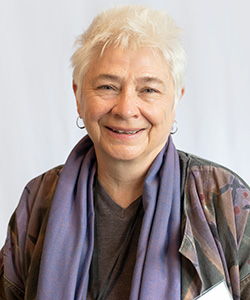
Monica Morrison
Knowledge Mobilization Specialist, Global Water Futures ObservatoriesUniversity of Saskatchewan
Born in Goose Bay, Labrador, Monica grew up watching the ice come and go in New Brunswick's Saint John River valley, studied anthropology at the University of New Brunswick, folk narrative at Memorial University of Newfoundland, and librarianship at the University of British Columbia, before moving to Ottawa to work on information resource management for the Canadian Centre for Folk Culture Studies, Canadian Arctic Resources Committee (CARC), and the then Department of Indian and Northern Affairs. She organised information for DIAND's Northern Regulatory Review and two Canadian royal commissions – the Westbank Inquiry and the Royal Commission on the Future of the Toronto Waterfront – before moving to Africa in 1991.
Until 2022 she lived and worked in southern Africa, developing information strategies in a local management consultancy in Zimbabwe, for Mozambique's National Institute for Health Research, and engaging with water-related knowledge and communications work from the African Ministers' Council on Water (AMCOW), BIOKAVANGO project, the Cuvelai Watercourse Commission (CUVECOM), the Global Water Partnership (GWP), International Union for the Conservation of Nature (IUCN), Permanent Okavango River Basin Water Commission (OKACOM), RESILIM project, the Southern Africa Development Community (SADC), and the University of Botswana's Okavango Research Institute (UB-ORI). In 2012 she created Moedi wa Kitso consulting services based in Maun, Botswana, centered on creation of knowledge products.
In 2021 she completed a PhD in research uptake and utilisation from Stellenbosch University's Centre for Evaluation, Science and Technology (CREST), with a thesis focused on the uptake of wildlife research in northern Botswana. Because so much of her work has involved trying to get data, information and knowledge into use, in all her roles she has followed a thread of curiosity about how formally and informally created knowledges interact and are taken up in policy and practice. Increasingly, her work with natural resources management issues has brought home the importance of sharing clear messages about the impact of climate change and the connecting role of water. She is looking forward to working with Global Water Futures science to create better understanding that leads to climate action.
Monica has family in New Brunswick and is married to Christiane Stolhofer, an artist.
